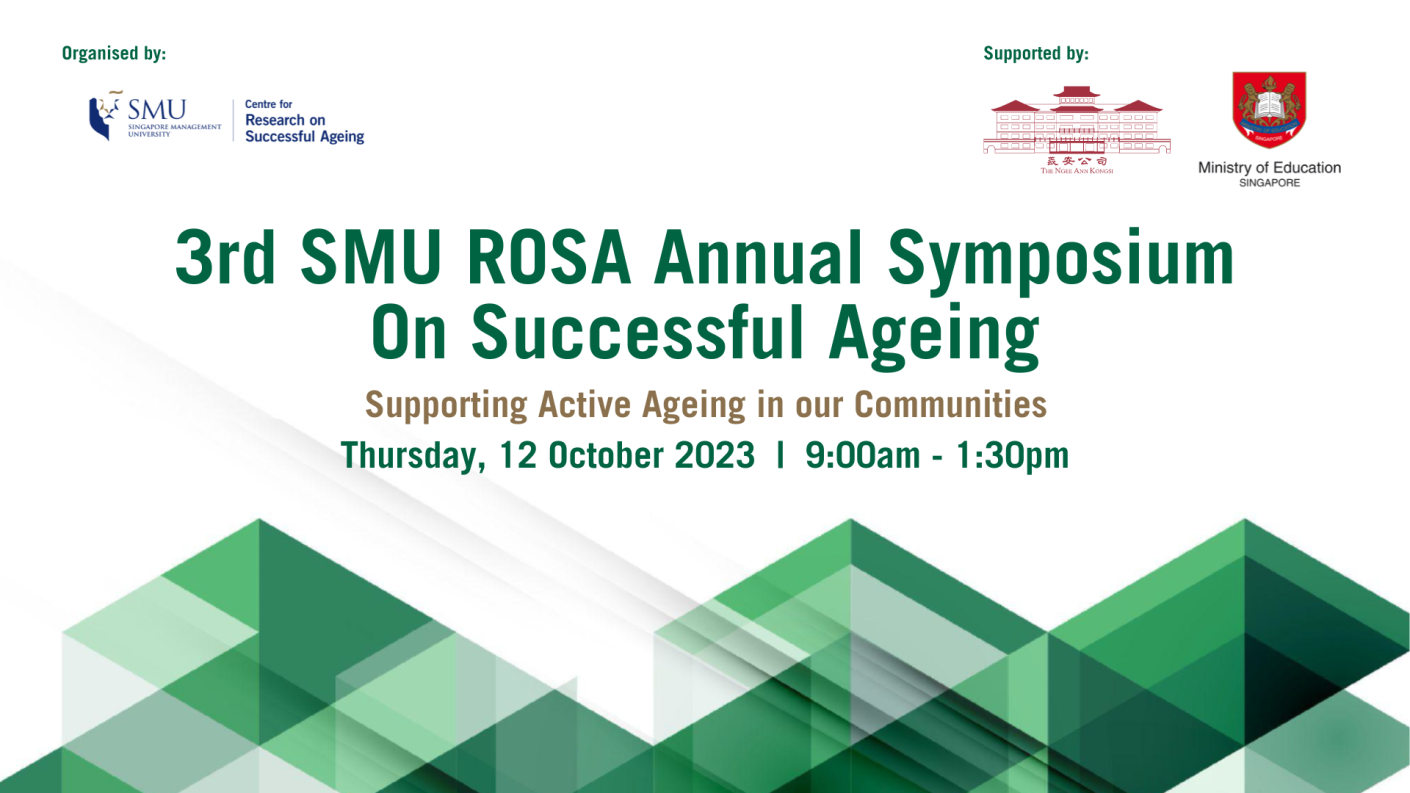
3rd SMU ROSA Symposium on Successful Ageing
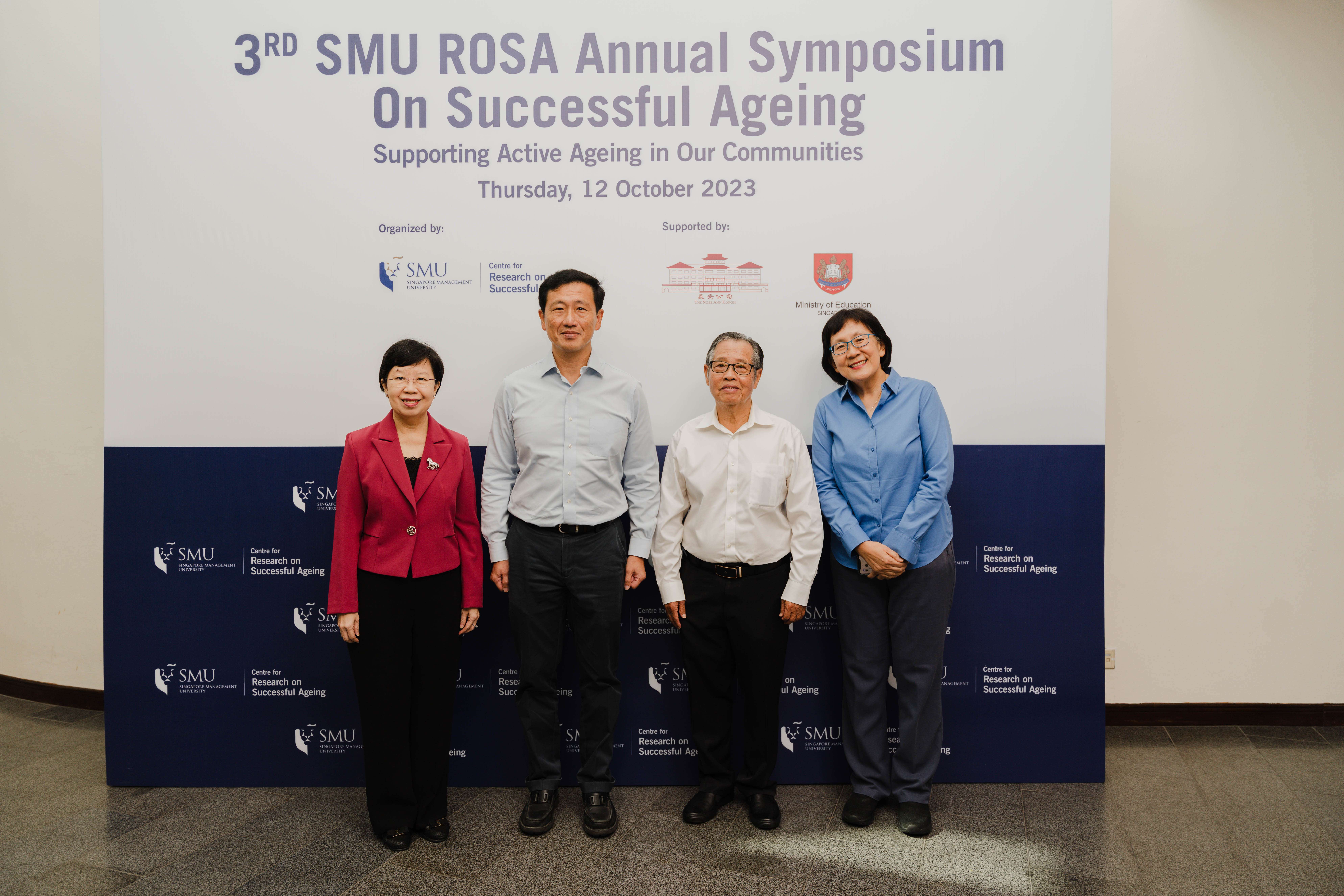 |
|
(left to right): Professor Lily Kong (President, SMU), Mr Ong Ye Kung (Minister for Health), Mr Lie Kee Pong (Vice-President, The Ngee Ann Kongsi), Professor Paulin Straughan (Director, Centre for Research on Successful Ageing) |
The 3rd Annual ROSA Symposium on Successful Ageing took place on the 12th of October 2023 in the Mochtar Riady Auditorium at the Singapore Management University (SMU) Administration Building, and on Zoom Webinar. This year’s theme was “Supporting Active Ageing in Our Communities”, with a focus on the transformation of the spaces in which we live and work, and a whole-of-society approach to enabling successful ageing for a super-aged society.
The symposium comprised of two segments: Workshop 1 on Transformation of Space to Support Ageing-in-Place, and Workshop 2 on Transformation of Work to facilitate Sustained Social Engagement. Both segments included short presentations by academics, researchers, social and industry experts, as well as lively discussions among the panel and the audience.
In total, over 316 participants attended the Symposium both physically and virtually. Of the 225 participants who attended the event in-person, 34 were our members from ROSA’s Singapore Life Panel®.
WELCOME ADDRESS
Professor Lily Kong, President of SMU
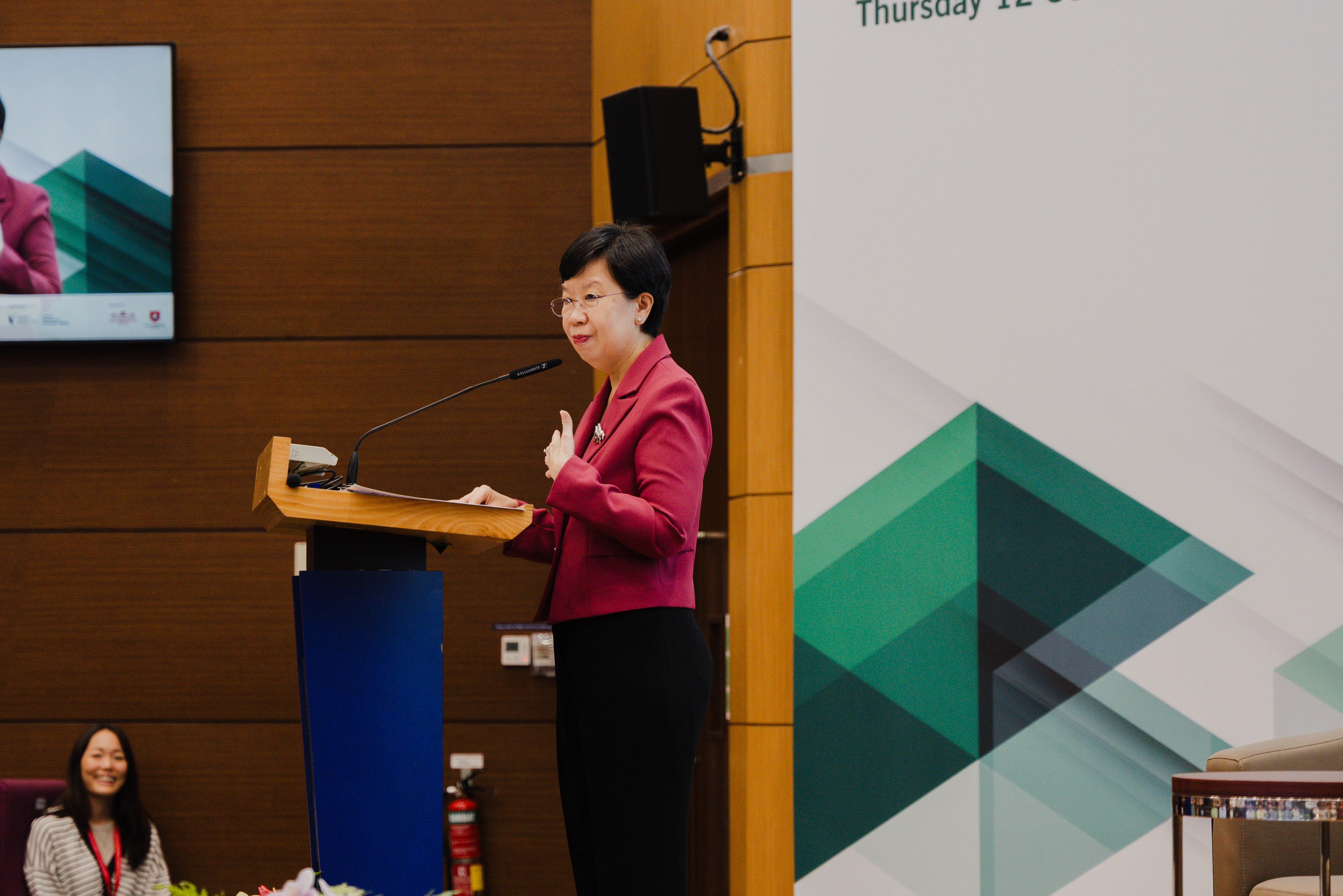 |
|
Professor Lily Kong giving her address. |
Professor Lily Kong, President of SMU, kicked off the 3rd Annual ROSA Symposium with a sprightly welcome address. Professor Kong acknowledged the need for a holistic view towards ensuring the well-being of an ageing population, as well as the need for multidisciplinary efforts toward healthy longevity. She highlighted some of ROSA’s work such as "Project Silverlight", Silver Zones, and the perceptions of financial challenges faced by older adults.
GUEST OF HONOUR’S ADDRESS
Mr Ong Ye Kung, Minister for Health
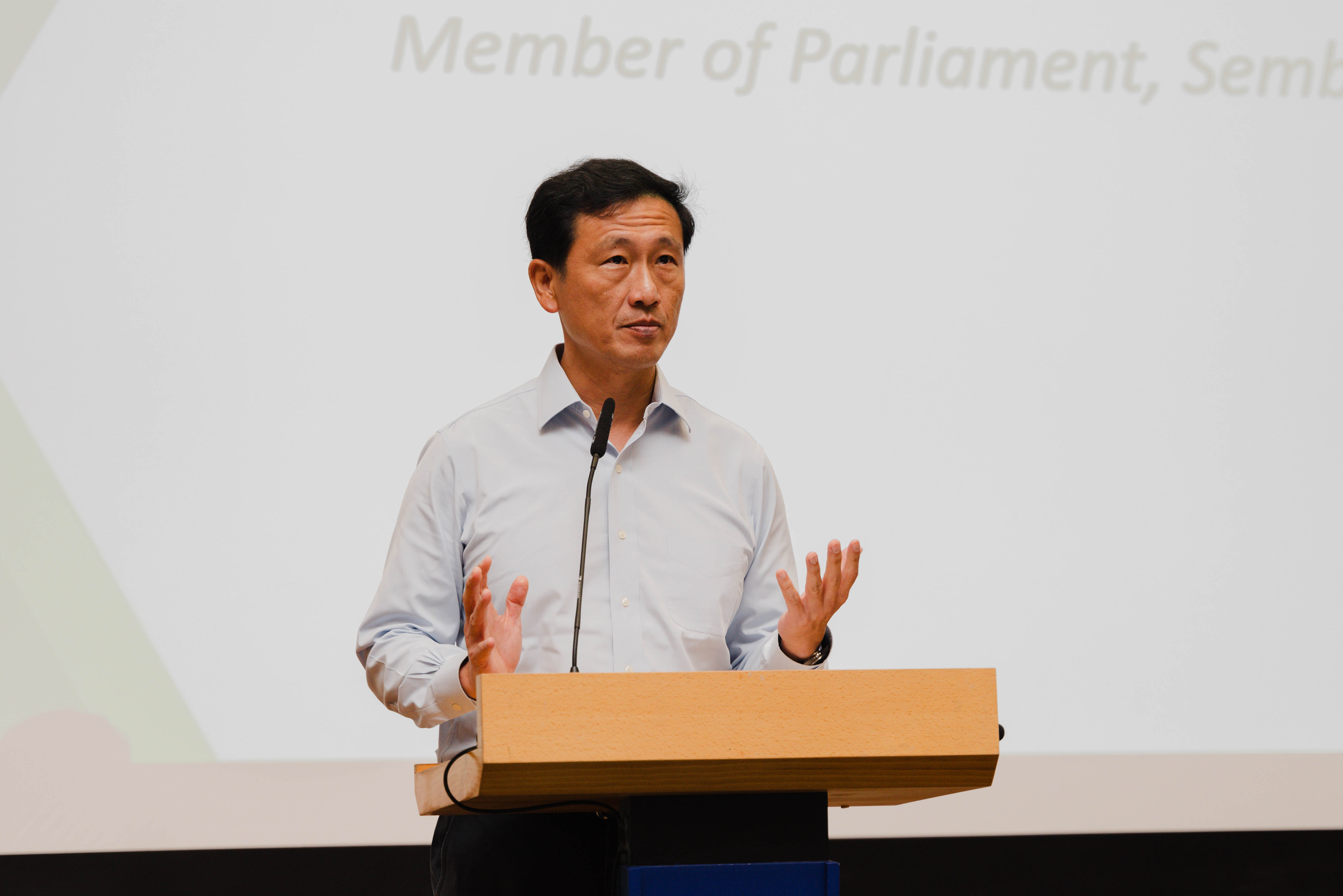 |
|
Mr Ong Ye Kung giving his address. |
We were most honoured to have Mr Ong Ye Kung, Minister for Health, grace the event with his inspiring address on the phenomenon of Blue Zones, and how Singapore, despite not having the distinctive characteristics of the populations in Blue Zones, was identified as a “Blue Zone 2.0” with long lifespans and health spans, which can be attributed to the infrastructure, policy and programmes through which people are nudged towards healthier behaviour. Mr Ong acknowledged ROSA’s role in expanding our understanding of older adults’ health and well-being in Singapore, and encouraged the continued inquiry into a sustainable, healthier and happier Singapore. You may access his full speech here.
WORKSHOP 1: TRANSFORMATION OF SPACE TO SUPPORT AGEING-IN-PLACE
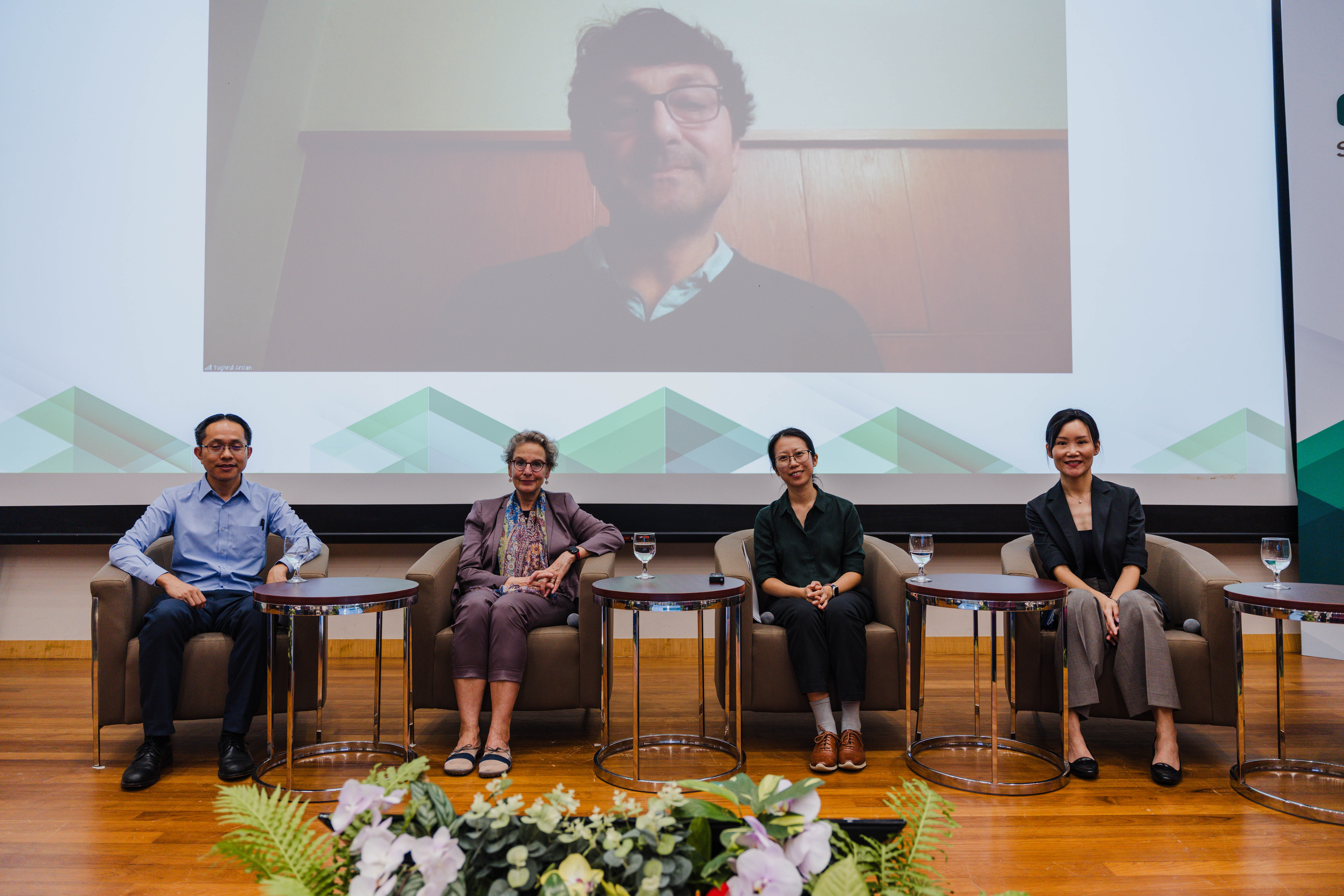 |
|
(left to right): Associate Professor William Tov, Professor Ursula Staudinger, Dr Tan Shin Bin, Dr Wan Chen K Graham,(on the screen): Professor Tughrul Arslan |
The discussion surrounding the transformation of the space we live in began with four short presentations by Professor Ursula Staudinger, Dr Tan Shin Bin, Dr Wan Chen K Graham, and Professor Tughrul Arslan respectively. The workshop was moderated by Associate Professor William Tov, Deputy Director of ROSA.
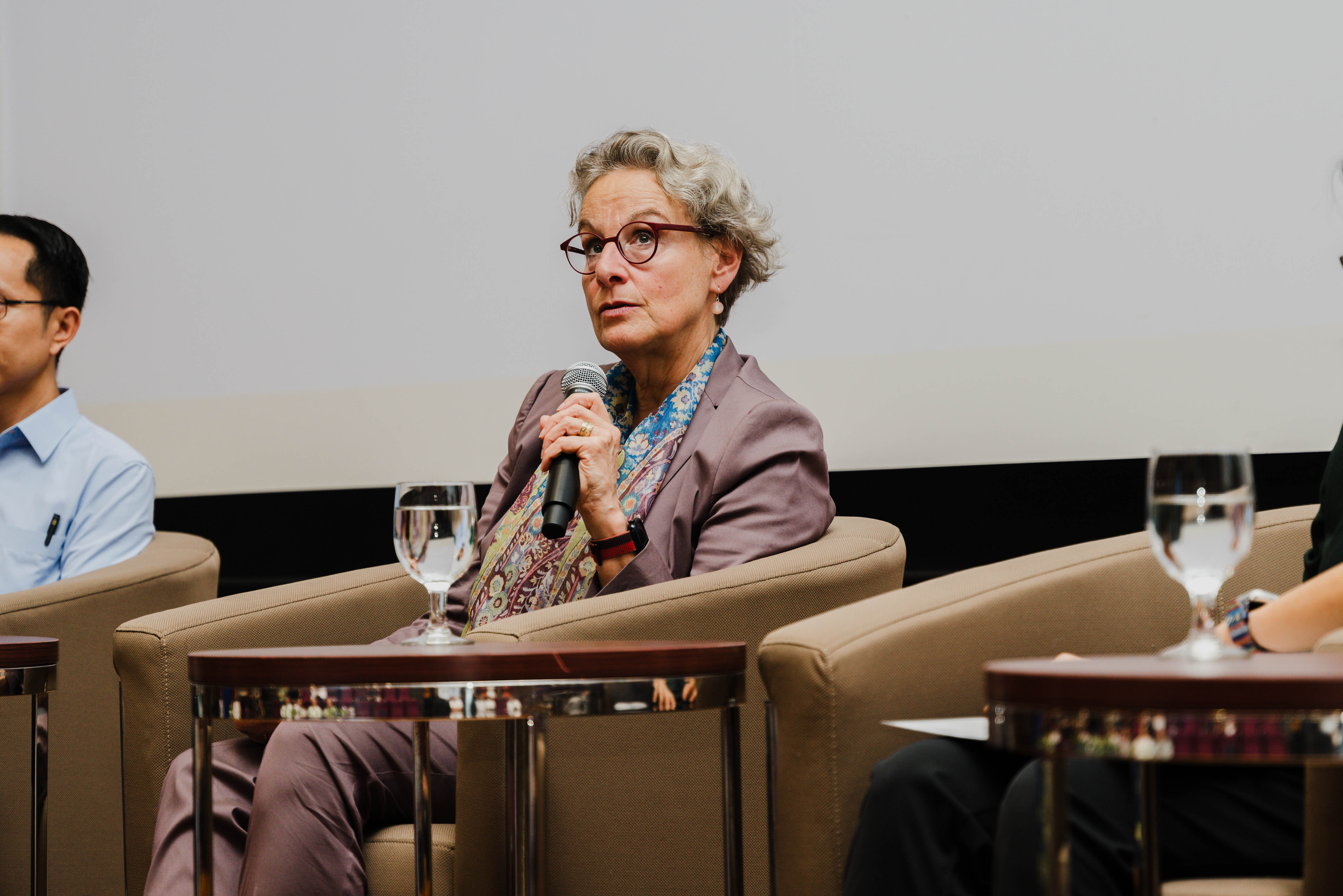 |
|
Professor Ursula Staudinger giving her presentation. |
Professor Ursula Staudinger, Rector of the Technische Universität Dresden, kickstarted this segment with her presentation on how the physical and built environment impacts our everyday lives as early as prenatal and early life, onwards to older age, and especially so as we age, as well as the need for further research on how to improve our living spaces to promote better health and well-being.
Some of the key findings from her presentation:
- The importance of the indoor built environment as adults age and their sphere of mobility shrinks, through features such as digital support to diagnose falls, the use of color, smell, and music in maintaining good emotional well-being.
- The need for more research on facilitative aspects in different environments to facilitate healthy ageing through encouraging us to train our brain, participate in social activities, and walk.
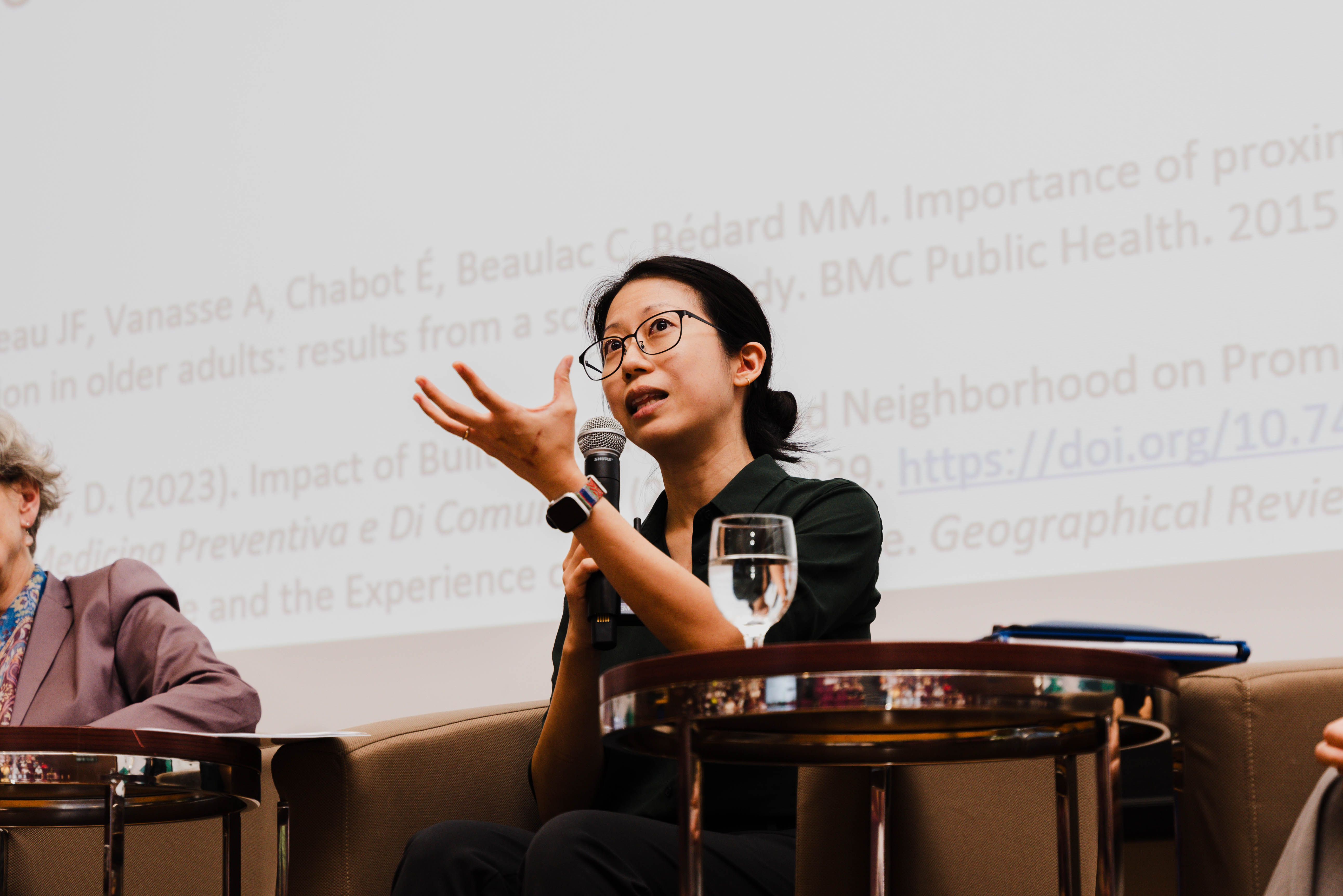 |
|
Dr Tan Shin Bin giving her presentation. |
Dr Tan Shin Bin, Assistant Professor in the Lee Kuan Yew School of Public Policy, National University of Singapore (NUS), continued the conversation on the importance of the built environment in promoting active ageing among older adults, as well as the importance of equitable built environment interventions for older adults.
Some of the key findings from her presentation:
- Neighbourhood environments should encourage physical activity, social inclusion, and a sense of agency. Built environment interventions that fall in the intersection of all three include community gardens and neighbourhood "documentation projects".
- The possibility of co-designing changes in neighbourhoods with residents, as well as to systematize it for long-term involvement.
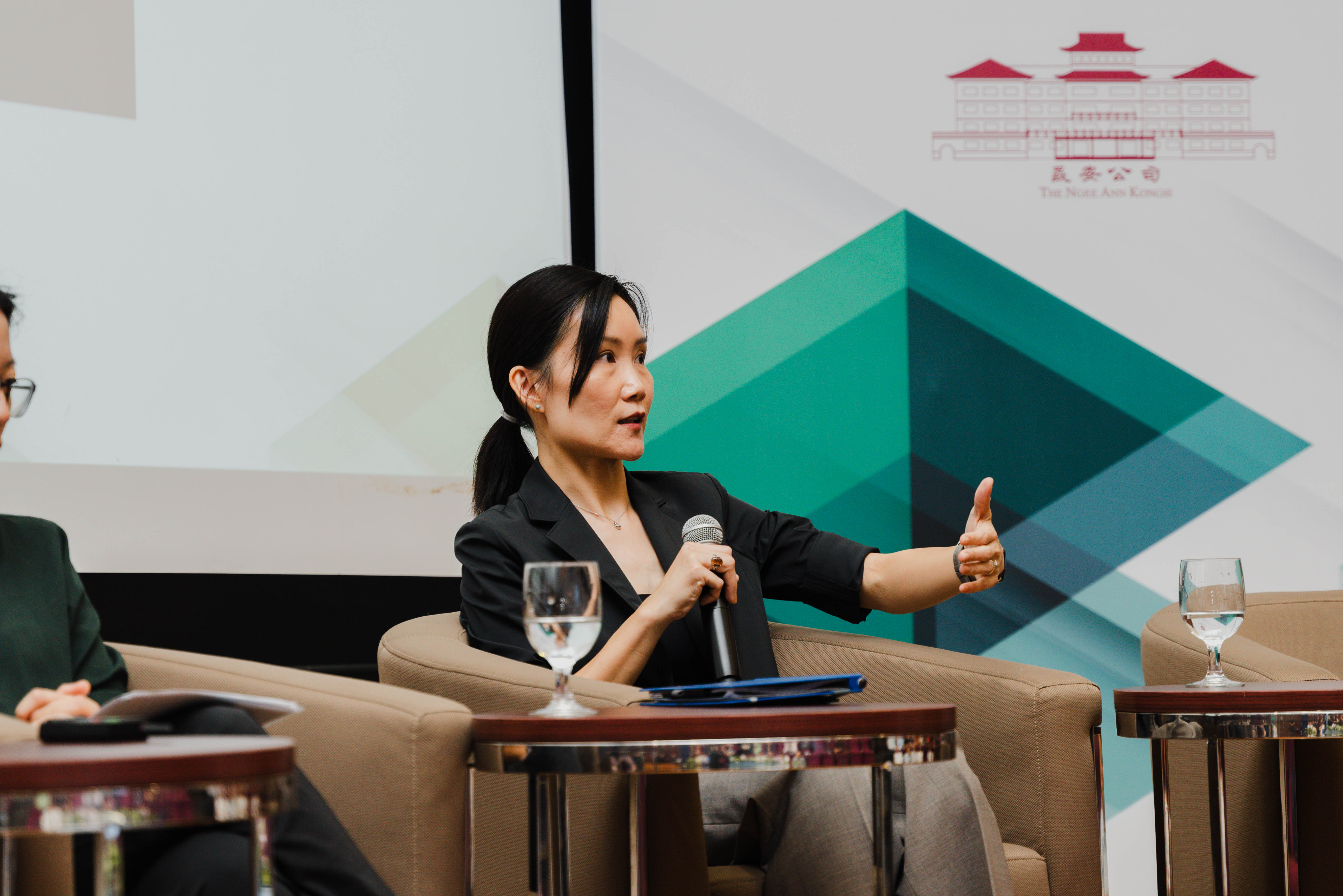 |
|
Dr Wan Chen K Graham giving her presentation. |
Following that, Dr Wan Chen K Graham, Deputy Director of Research at Agency for Integrated Care, dived deeper into age-friendly and dementia-inclusive neighbourhoods and shared some principles and guidelines for building such spaces, as well as the various research projects on older adults and the built environment in which the AIC is involved.
Some of the key findings from her presentation:
- Four key insights from design ethnography for dementia-inclusive neighbourhoods: (i) safety first, (ii) less is more, (iii) retain familiarity, and (iv) introduce new choices gradually.
- Useful resources: 360 Virtual Reality Dementia Friendly HDB Home Design Guide, Elderly- and Dementia- Inclusive Environment Guidebook
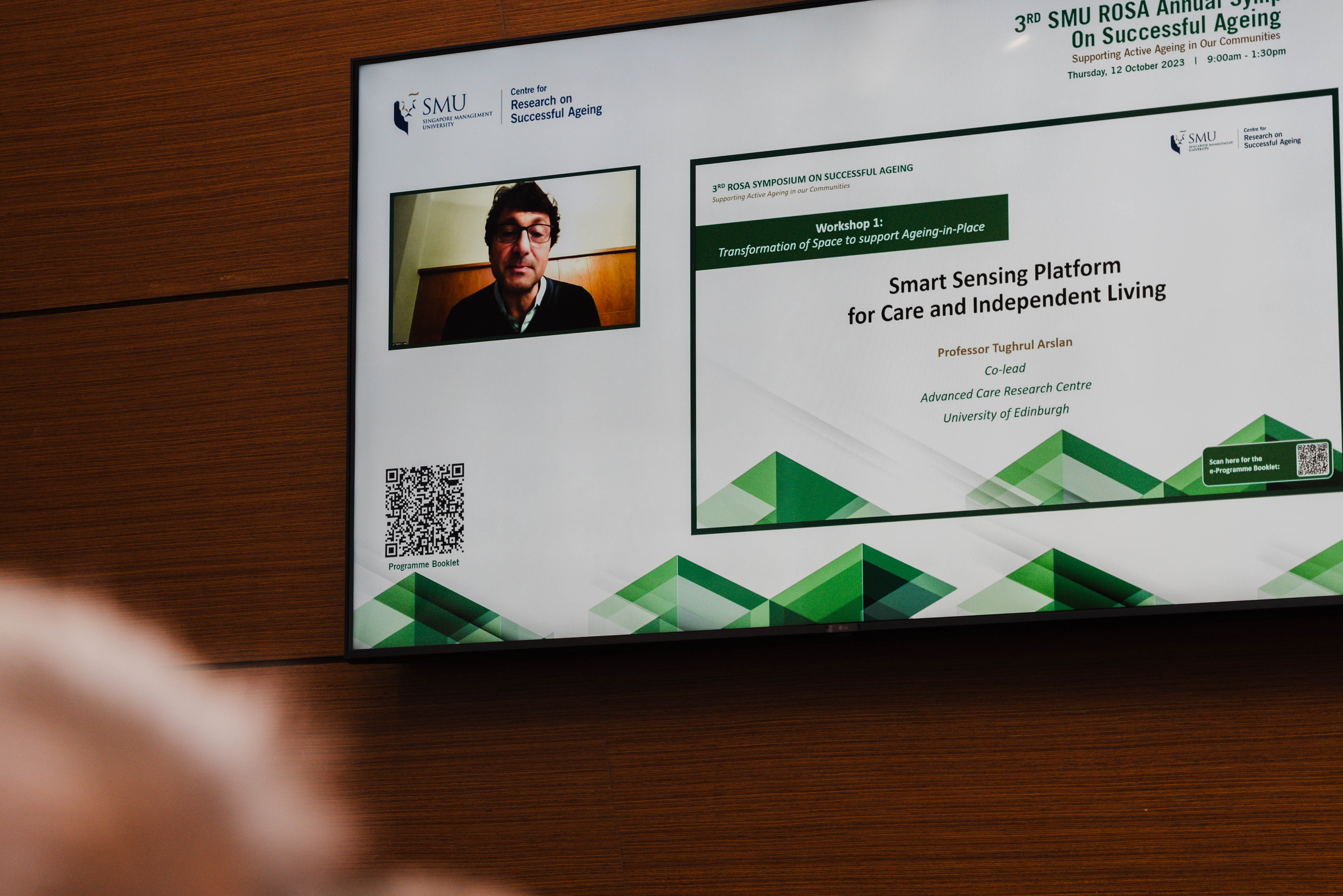 |
|
Professor Tughrul Arslan giving his presentation via Zoom. |
Last but not least, Professor Tughrul Arslan, Chair of Integrated Electronic Systems in School of Engineering, University of Edinburgh, presented his research on smart sensing platform for care and independent living, providing a fresh and necessary perspective on how we can integrate technology and AI into caring for older adults.
Some of the key findings from his presentation:
- The aim of the study was to create a new form of measuring the effects of the environment on people’s health parameters and habits, with an emphasis on non-intrusive and safe sensors.
- The data collected, together with data from General Practitioners and caregivers, can provide data for AI engines to predict or detect alarms.
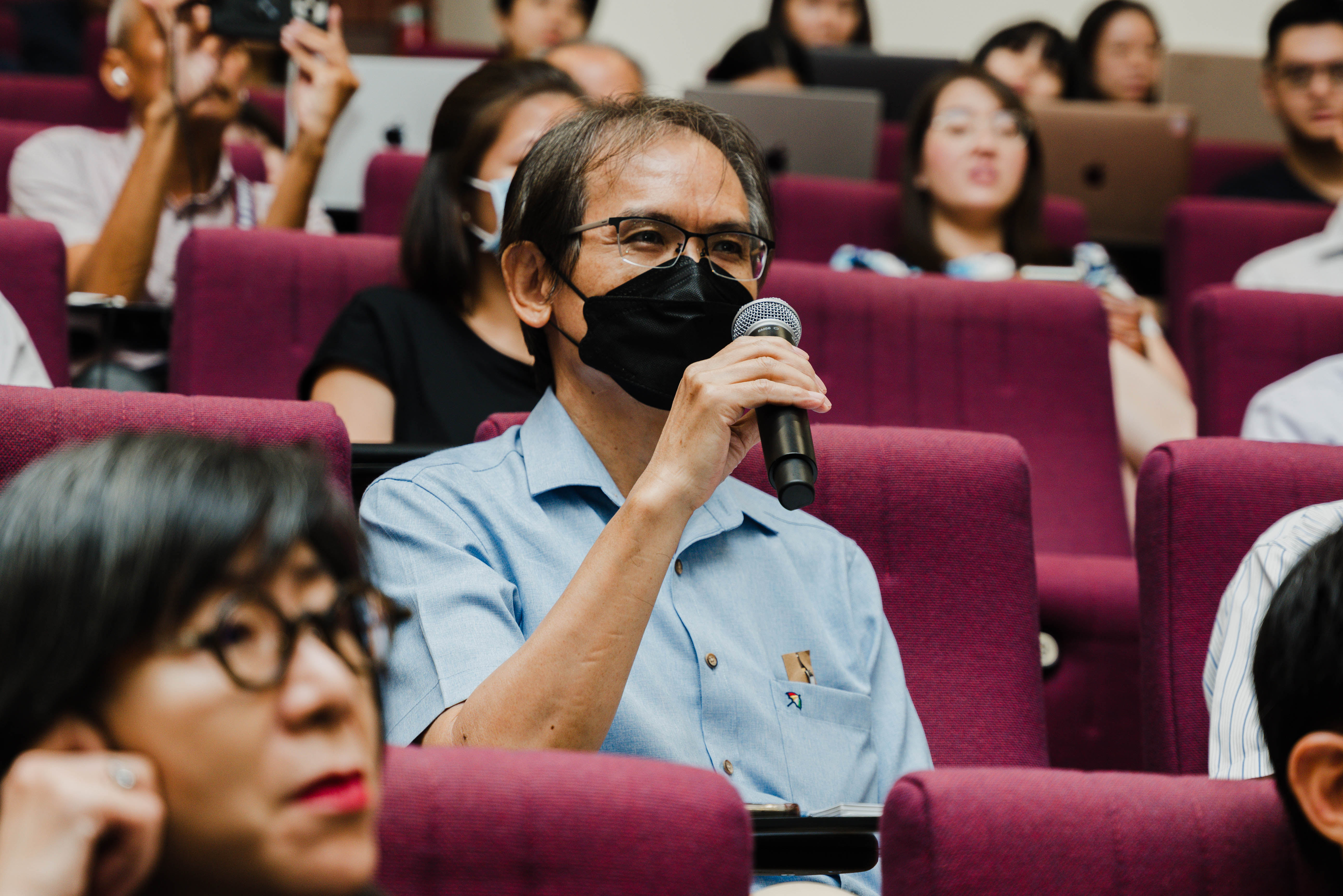 |
|
A member of the public posing a question to the panel speakers. |
The discussion segment that followed saw the researchers, healthcare workers, and SLP members raise questions and concerns about the impacts of modifying the environment, managing rapid changes in the environment, and how we can assist older adults in the ageing process while retaining a sense of agency in them. The conclusions that were drawn from this discussion touched on the implications for various groups of people in society, including individuals, caregivers, researchers, and policymakers:
- The need to create a lifestyle that helps us retain functionality, and to be motivated to continue to take care of tasks within our ability and capacity.
- More empirical research is needed from planners and scientists to study the impact of modifying the environment on people’s health and well-being.
- It is crucial that we incorporate the use of technology to enhance care and safety, such as emergency prevention, and to galvanize people to be independent.
WORKSHOP 2: TRANSFORMATION OF WORK TO FACILITATE SUSTAINED SOCIAL ENGAGEMENT
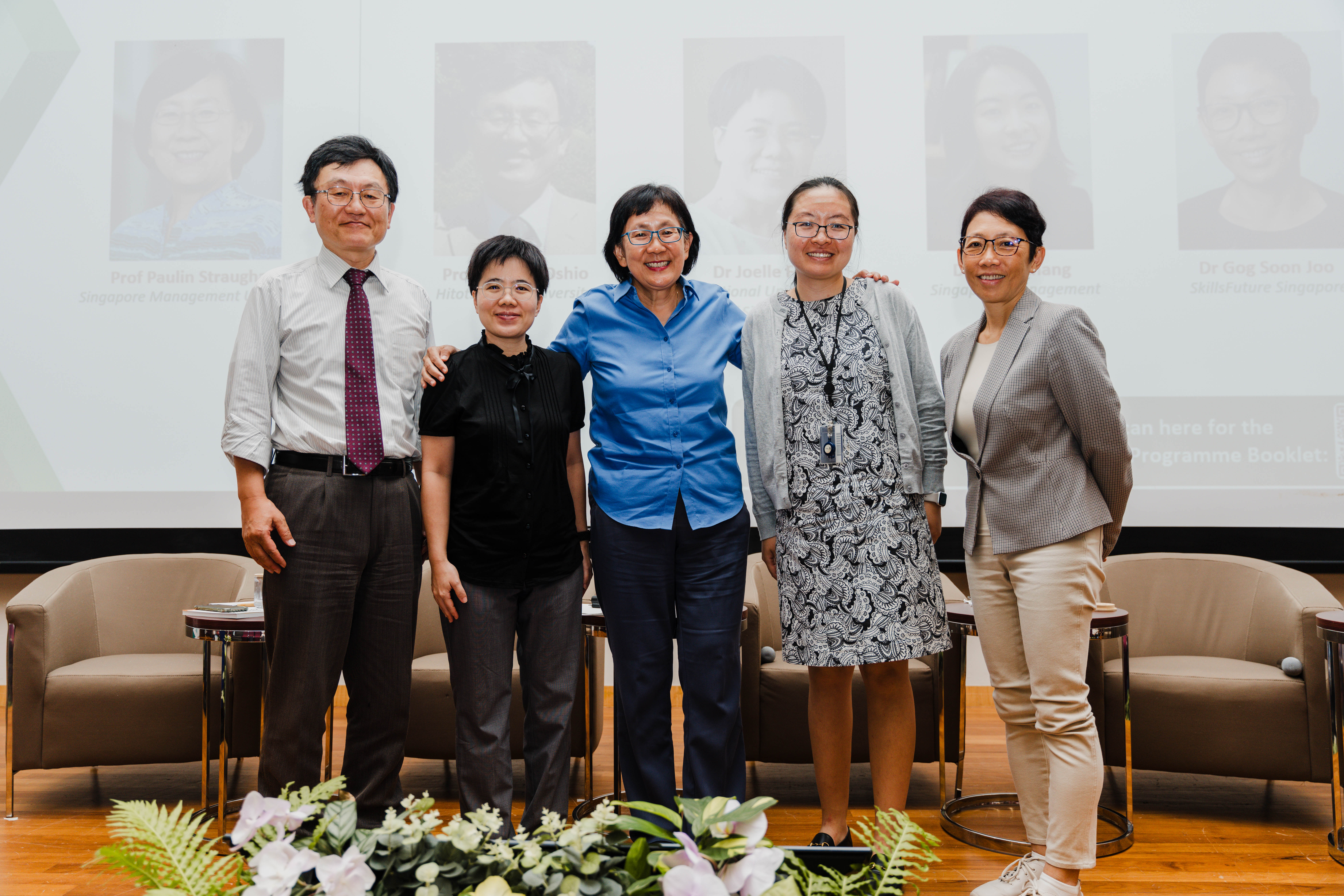 |
|
(left to right): Professor Takashi Oshio, Dr Joelle Fong, Professor Paulin Straughan, Dr Xuan Zhang, and Dr Gog Soon Joo |
The second workshop delved into the transformation of work to facilitate sustained social engagement among older adults. We were honoured to welcome Professor Takashi Oshio, Dr Joelle Fong, Dr Xuan Zhang, and Dr Gog Soon Joo to the stage to deliver insightful presentations, themed on reformulating employment, pension, and social policies to foster a longevity economy. The workshop was moderated by Professor Paulin Straughan, Director of ROSA.
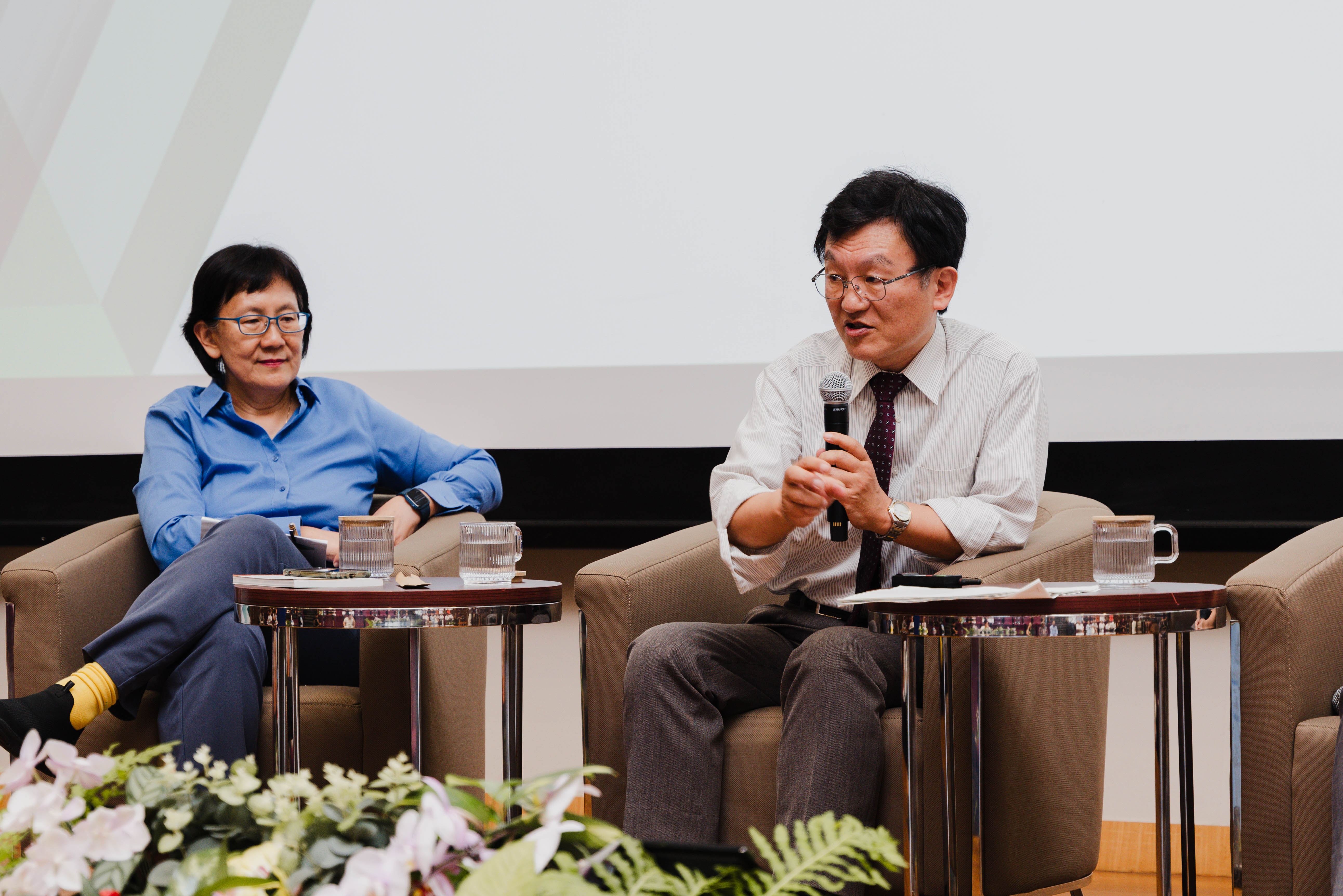 |
|
(Professor Takashi Oshio (right) giving his presentation. |
Professor Takashi Oshio, based in the Institute of Economic Research at Hitotsubashi University, opened the workshop with his presentation on raising retirement and pensionable ages in Japan and the potential implications this may have for the health of Japanese older adults.
Some of the key findings from his presentation:
- Among Japanese older adults, employment rates can be raised by 20-30 percentage points for those aged 65-70 years, suggesting untapped work capacity among older persons.
- Working longer will improve health in general but may worsen mental health, suggesting the need for flexible working arrangements.
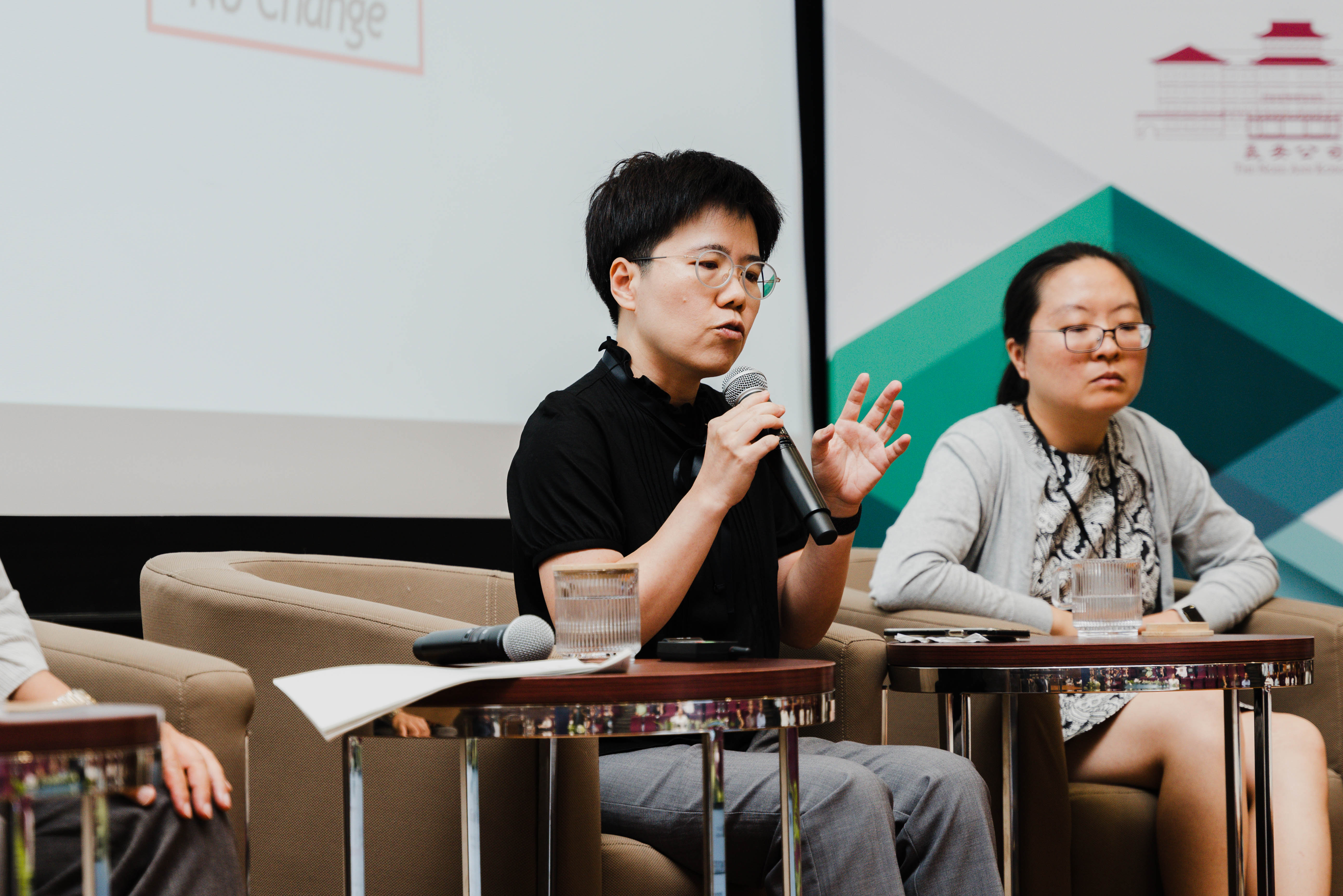 |
|
Dr Joelle Fong giving her presentation. |
Next, Dr Joelle Fong, Assistant Professor in the Lee Kuan Yew School of Public Policy, National University of Singapore (NUS), delivered her presentation on the evolution of the CPF scheme to support an ageing workforce and the importance of building financial literacy among older adults to improve their financial behaviour and retirement adequacy.
Some of the key findings from her presentation:
- Social policies such as pension systems (e.g., CPF) and social security schemes (e.g., CareShield Life, Medishield Life) help to protect us against longevity risks.
- Recent enhancements to CPF aim to encourage older workers to work longer and retire with more savings through a combination of increased CPF contributions, annual bonuses, and investment opportunities.
- Based on SLP data, raising financial literacy may translate to better financial behaviour and retirement planning among older adults.
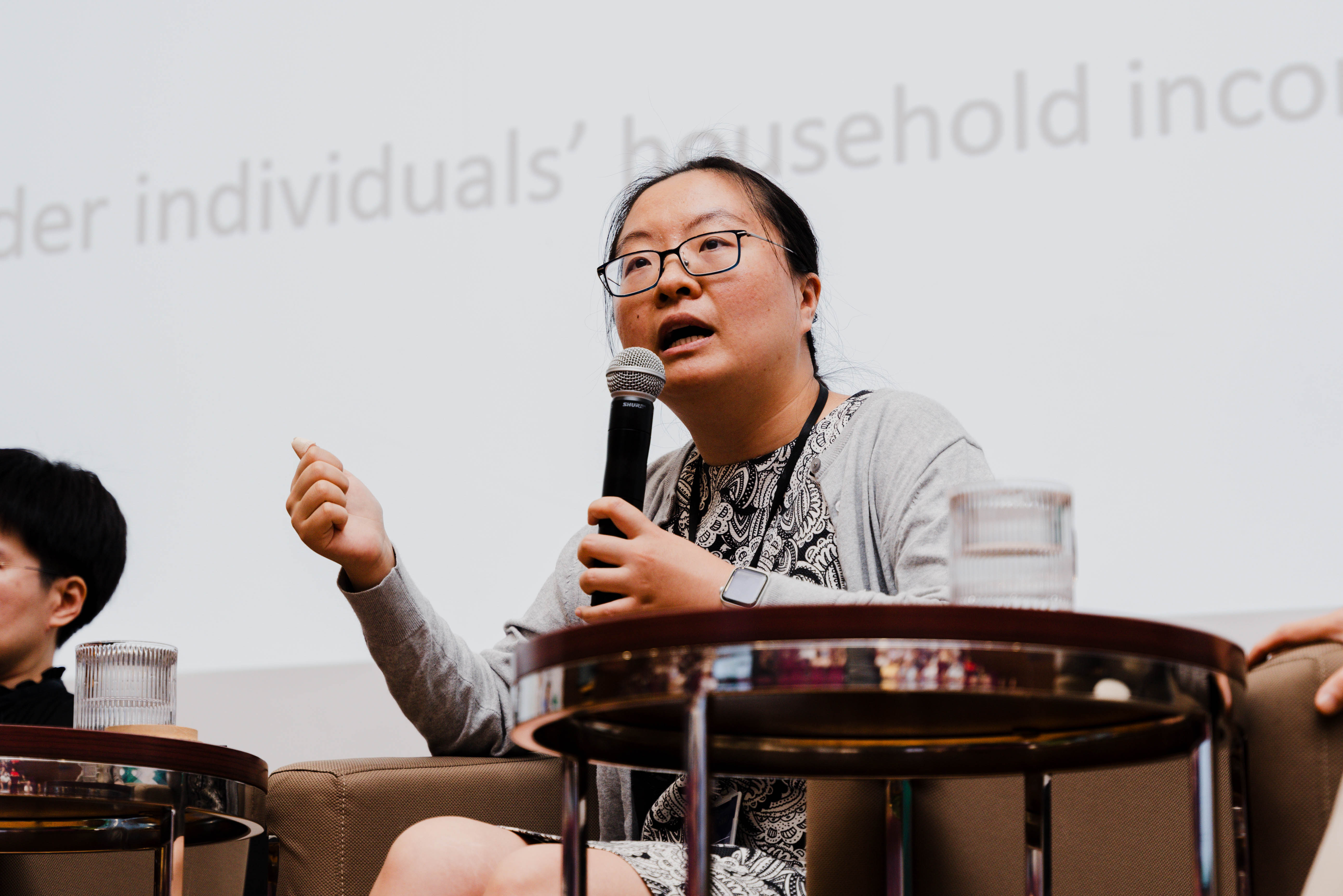 |
|
Dr Xuan Zhang giving her presentation. |
Following that, Dr Xuan Zhang, Assistant Professor in the School of Economics, Singapore Management University (SMU), presented her research on the effects of raising pension access and statutory retirement age on the labour supply and well-being of older adults.
Some of the key findings from her presentation:
- To maintain the sustainability of the social security system in an ageing society, one way is to increase labour supply of older adults.
- Extending the maximum re-employment age is an effective policy to retain retain older men in the labour market. Compared to the statutory retirement age, pension access has a more limited impact on labor supply, except for certain groups of low-wealth and high-wealth men.
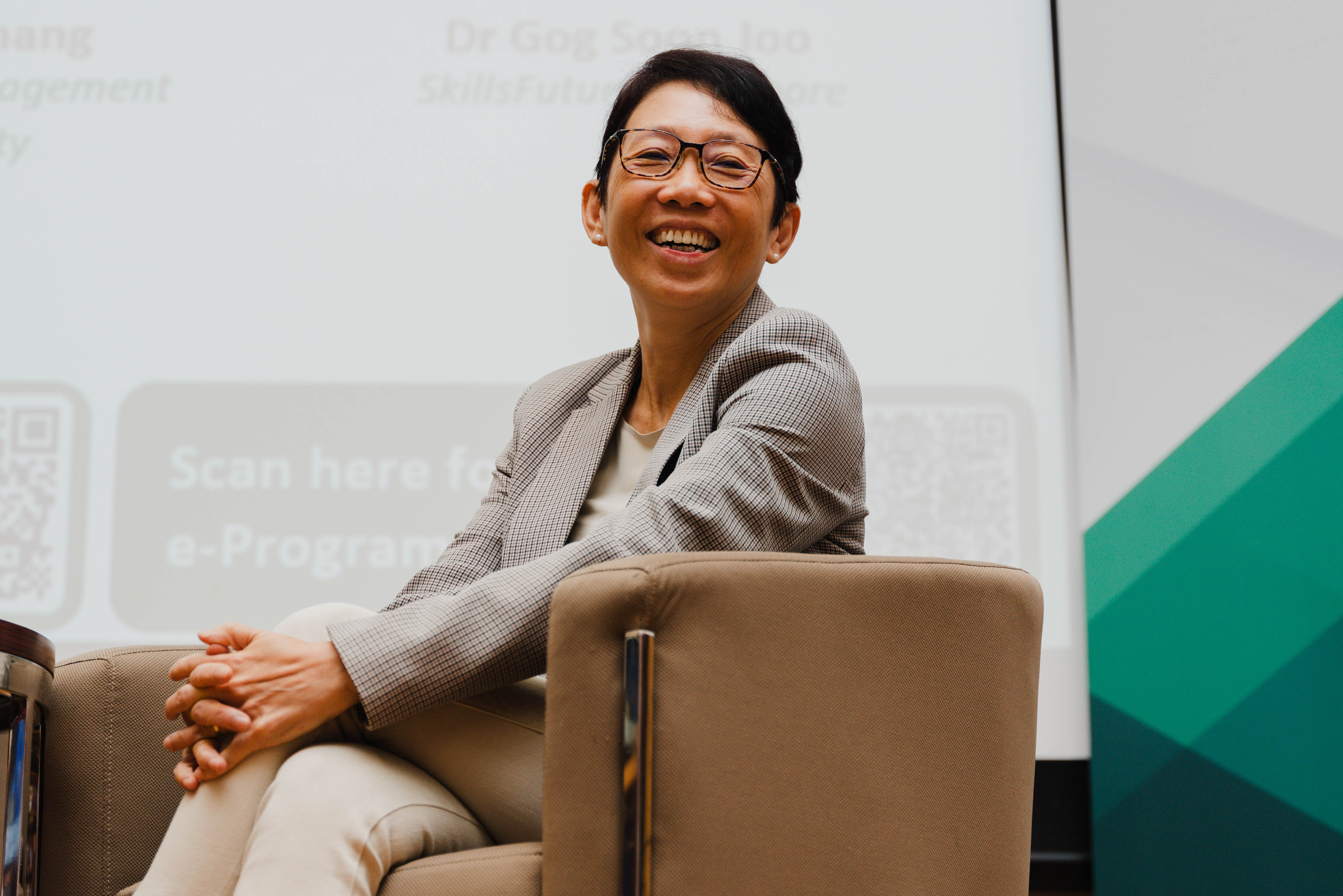 |
|
Dr Gog Soon Joo giving her presentation. |
Finally, Dr Gog Soon Joo, Chief Skills Officer of SkillsFuture Singapore, invited all in attendance to rethink work design and learning access in the longevity economy. She stressed the need to reconsider our current reference point for retirement and work towards normalizing lifelong learning.
Some of the key findings from her presentation:
- Singapore faces dual issues of older adults wanting to work but not working, as well as those who are not working and do not want to work.
- Existing resources and supports for employment and reskilling/upskilling can aid older adults in overcoming cost, choice, and situational barriers.
- Working with ROSA on a research project may yield actionable insights to inform policy and practice on work design, job matching, recommender system, and enable older adults to overcome access barriers.
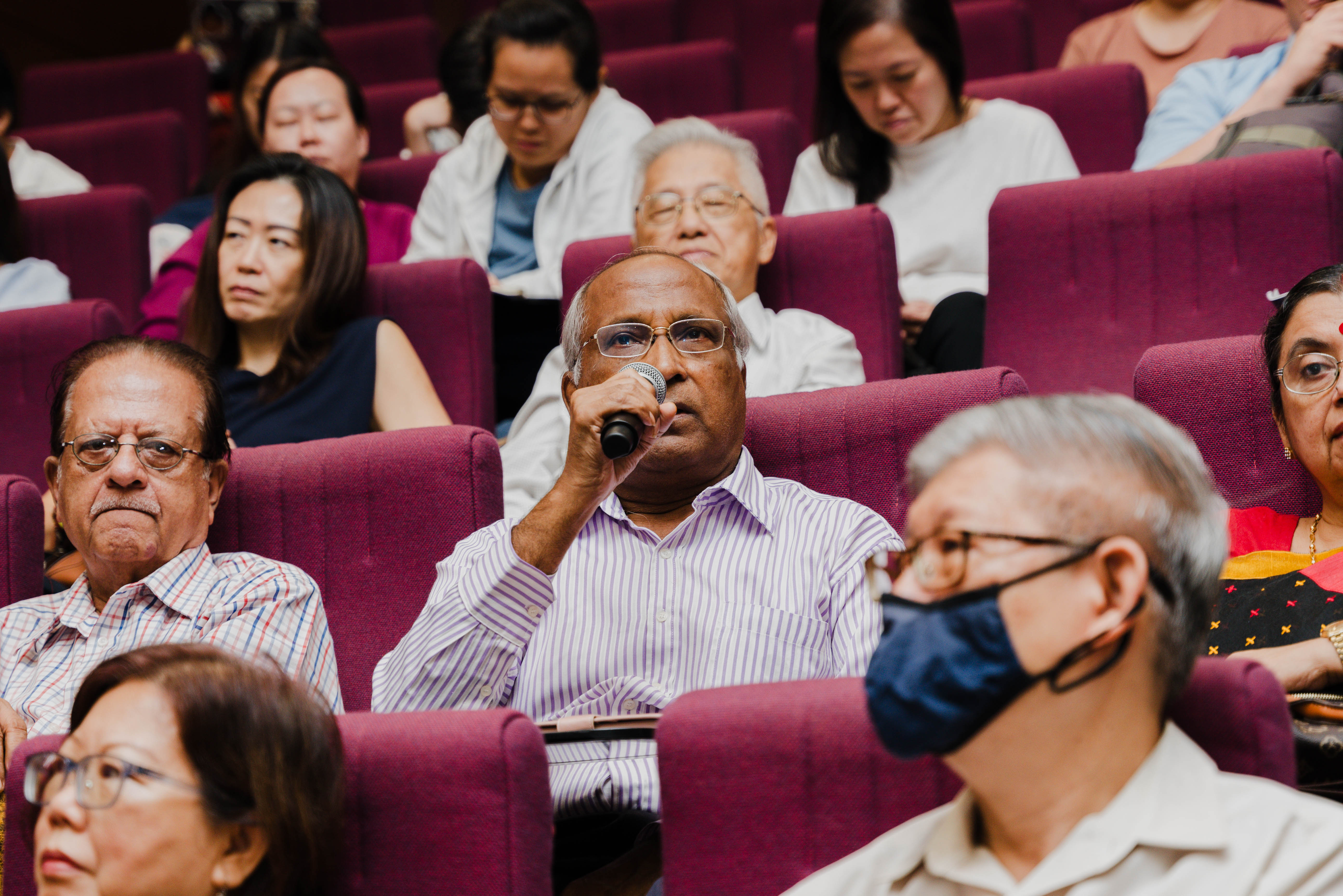 |
|
One of our SLP members posing a question to the panel speakers. |
The second workshop concluded with a brief Q&A session, opening with a suggestion by an SLP member to rephrase “successful ageing” to “happy living.” A second question was raised by an SMU PhD student, who asked whether there is equity in employment opportunities across age bands and socioeconomic levels. A summary of conclusions drawn from the esteemed panel is provided below:
- Professor Oshio commented that when we consider full-time and part-time workers in Japan, there is an uneven supply and demand for roles. Further research is needed to examine these gaps.
- Dr Gog suggested that since we do not have much data on the equitability of work opportunities, future collaboration between labor economists and social service providers would be fruitful.
- Professor Straughan wrapped up the discussion by stating, if we leverage on existing policies, we should have sufficient job opportunities for older adults. ROSA’s research briefs highlight salient differences between older adults of different age groups; therefore, we cannot take a one-size-fits-all approach.
CLOSING
To conclude the 3rd Annual ROSA Symposium on Successful Ageing, Professor Straughan offered a few closing remarks and invited everyone in attendance to enjoy a scrumptious lunch spread. The ROSA team would like to extend our heartfelt gratitude to our Guest of Honour, Minister Ong; Professor Kong, SMU President, for her support of ROSA’s work and for delivering the welcome address; our esteemed panellists; and to all of our fellow colleagues, students, and guests who contributed meaningfully to the discussions. The event was made possible with the generous support of The Ngee Ann Kongsi. If you wish to view the highlights of the event, you may do so at the link here.
As always, please reach out to rosa@smu.edu.sg should you have any queries about this event or future ones!